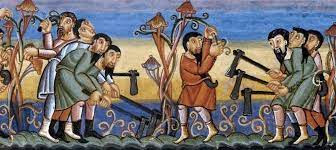It must have been difficult for the Pharisees to hear this parable
from Jesus. As I have mentioned in the past, I think the Pharisees are often
misunderstood. During the time of Jesus, Israel was occupied by a pagan empire
(Rome). They had been exiled and returned to their homeland, but only as a
vassal state (with perhaps some temporary respites). The prophets had warned the
Israelite people that abandoning the Torah and prophetic admonitions to stay
faithful to the covenant would result in disaster. This disaster befell the Israelite
people in a horribly tragic way. So, the Pharisees arise as a sect within Second
Temple Judaism teaching strict adherence to Torah. If abandoning Torah led to
problems, then faithfulness to Torah would be the solution. Hence, many of the
strictures we read about them placing upon the people. For example, only walking
a certain number of steps, or even so much as picking up a mat on the Sabbath
was a sin. Restoring a person to health was certainly ruled out. A certain
perversity crept into their zealousness for Torah. This was not the case for
all of them, but by and large the Pharisees were big on Torah, tradition, and
piety. These are not necessarily bad things in and of themselves. But losing
the forest for the trees is endemic to the human condition.
Naturally, when Jesus comes along speaking with divine authority,
the Pharisees are going to take note. Who was this man who spoke without referencing
a certain rabbi? Where was He even trained in Torah? Who was this man who spoke
presumptuously on behalf of God? Who could even think it conceivable to refer
to themselves as The Son of Man? Jesus performed many signs and wonders, which
must have been equally as baffling. Something was happening. The soberest explanation was that God was doing something. However, the Pharisees were
so focused on the ant on the bark of the tree that they missed the beautiful forest
flowering around them. They missed the path through the forest that God had
laid for them. They missed the very purpose of their journey. Zeal without
rectitude to God turns us in on ourselves.
In the parable of the tenants, Jesus brings to vivid
life what happens when zeal is unchecked. It could be fervor for anything, money,
power, true religion. When something comes along that calls us to question ourselves,
we hate it. We do not like constructive criticism even from the best of friends
with the noblest intentions. When the tenants are called to account, they
believe they are justified in snubbing the owner. The owner has not seen fit to
come, so they kill the proxy. And then another one.
How often do we seek to stamp out those corrections God
sends to us? It might be little things here or there to tell us we are on the
wrong path. How much do we hate to be told we are not perfect, that the
universe does not revolve around us? We simply do not like to be told we have
lost sight of the forest. We do not like to hear that we are off track from our
purpose. Jesus points out this pattern, particularly in the spiritual life of
Israel, and the Pharisees react as many of us would. They are utterly
indignant. Jesus tells the Pharisees they are following the same pattern of
inward-turning that previous generations did. They are only doing it under a
different guise. We can be very much like the Pharisees. Like them, there will
always be a way for us to rationalize. More importantly, though, the power of
God’s grace can easily penetrate through to our innermost being and draw us
upward. The question is our response to this drawing.

No comments:
Post a Comment